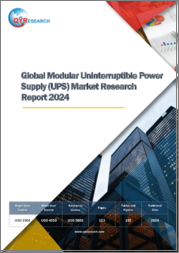
|
시장보고서
상품코드
1899749
모듈러식 UPS(Uninterruptible Power Supplies) 시장 규모, 점유율, 성장 분석 : 토폴로지별, 위상별, 조직 규모별, 용량별, 최종사용자별, 지역별 - 업계 예측(2026-2033년)Modular Uninterruptible Power Supply Market Size, Share, and Growth Analysis, By Topology (Standby UPS, Line Interactive UPS), By Phase, By Organization size, By Capacity, By End user, By Region - Industry Forecast 2026-2033 |
||||||
세계의 모듈러식 UPS(Uninterruptible Power Supplies) 시장 규모는 2024년에 44억 6,000만 달러로 평가되며, 2025년 48억 6,000만 달러에서 2033년까지 96억 2,000만 달러로 성장할 전망입니다. 예측 기간(2026-2033년)의 CAGR은 8.9%로 예측됩니다.
모듈형 무정전 전원공급장치(UPS) 시장은 다양한 부하 요건을 충족하는 작고 유연한 시스템에 대한 수요 증가로 인해 크게 성장하고 있습니다. 이러한 적응성을 통해 중요도가 낮은 작업을 '절전 모드'로 원활하게 전환할 수 있으며, 기존 고정 용량 시스템에서 부족했던 효율성을 향상시킬 수 있습니다. 또한 모듈식 UPS 시스템은 서비스 및 유지보수의 효율성을 높여줍니다. 모듈 교체는 보통 현지 서비스 기술자의 작업으로 약 30분 정도면 완료됩니다. 이러한 효율성으로 인해 기존 타워형 UPS 시스템에서 모듈형 설계로 전환하고 있습니다. 또한 코로케이션 및 클라우드 서비스의 확대와 다양한 분야에서 클라우드 애플리케이션의 사용 증가는 모듈형 UPS 시장의 성장을 가속할 것으로 예측됩니다. 그러나 데이터센터 이외의 분야에서 모듈형 UPS의 장점에 대한 인식이 높아지는 것이 지속적인 성장을 위해 여전히 중요합니다.
세계 모듈형 무정전 전원 공급 장치 시장 성장 촉진요인
모듈형 무정전 전원공급장치(UPS)에 대한 수요는 주로 다양한 산업에서 디지털 기술, 클라우드 컴퓨팅, 데이터 중심 업무에 대한 의존도가 높아짐에 따라 증가하고 있습니다. 기업 및 조직이 서비스 중단 없는 신뢰성을 보장하기 위해 노력하는 가운데, 특히 데이터센터 및 중요 IT 인프라에서 강력한 전원 보호 시스템의 필요성은 매우 중요합니다. 이러한 지속적인 운영 유지에 중점을 둔 노력은 모듈형 UPS 솔루션의 중요성을 강조하고 있습니다. 이 솔루션은 확장성과 효율성을 겸비한 전원 백업 옵션을 제공하여 정전으로부터 보호하고, 다양한 부문의 중요 서비스를 원활하게 운영할 수 있도록 지원합니다.
세계 모듈형 무정전 전원 공급 장치 시장 성장 억제요인
모듈식 무정전전원장치(UPS) 시스템과 관련된 높은 초기 투자비용은 보급에 큰 걸림돌이 되고 있습니다. 이러한 기술이 제공하는 장기적인 혜택과 효율성에도 불구하고 많은 조직은 초기 비용을 큰 장벽으로 여길 수 있습니다. 이러한 비용 요소는 특히 예산이 한정된 중소기업에서 모듈형 UPS 솔루션으로의 전환을 방해하는 요인이 될 수 있습니다. 그 결과, 이러한 첨단 전원 백업 시스템의 성장과 각 업계에서의 보급을 가로막는 중요한 과제로 인식되는 재정적 부담이 남아있습니다. 시장 침투율과 채택률을 높이기 위해서는 이러한 비용 문제를 해결하는 것이 필수적입니다.
세계 모듈형 무정전 전원공급장치(UPS) 시장 동향
세계 모듈형 무정전 전원공급장치(UPS) 시장은 확장성과 모듈성에 대한 집중적인 관심으로 인해 점점 더 견인되고 있습니다. 이를 통해 기업은 유연한 방식으로 전원 보호 능력을 강화할 수 있습니다. 조직은 변화하는 업무 요구에 따라 단계적으로 용량을 확장할 수 있는 모듈식 UPS 시스템에 초점을 맞추었습니다. 이러한 적응성은 자원 배분을 최적화할 뿐만 아니라 필요한 경우에만 추가 모듈을 투자할 수 있으며, 자본 지출을 크게 줄일 수 있습니다. 또한 이러한 추세는 다양한 분야에서 지속적인 가동시간의 중요성이 높아짐에 따라 끊임없이 변화하는 기술 환경에서 신뢰성과 효율성을 겸비한 전력 솔루션의 필요성을 반영하고 있습니다.
자주 묻는 질문
목차
서론
- 조사의 목적
- 조사 범위
- 정의
조사 방법
- 정보 조달
- 2차와 1차 데이터 방법
- 시장 규모 예측
- 시장 전제조건과 제한
개요
- 세계 시장 전망
- 공급과 수요 동향 분석
- 부문별 기회 분석
시장 역학과 전망
- 시장 규모
- 시장 역학
- 촉진요인과 기회
- 억제요인과 과제
- Porter의 산업 분석
주요 시장 인사이트
- 주요 성공 요인
- 경쟁의 정도
- 주요 투자 기회
- 시장 에코시스템
- 시장의 매력 지수(2025년)
- PESTEL 분석
- 거시경제 지표
- 밸류체인 분석
- 가격 분석
- 규제 상황
- 사례 연구
세계의 모듈러식 UPS(Uninterruptible Power Supplies) 시장 규모 : 토폴로지별 & CAGR(2026-2033년)
- 스탠바이 UPS
- 라인 인터랙티브 UPS
- 더블 컨버전 온라인 UPS
세계의 모듈러식 UPS(Uninterruptible Power Supplies) 시장 규모 : 위상별 & CAGR(2026-2033년)
- 단상
- 삼상
세계의 모듈러식 UPS(Uninterruptible Power Supplies) 시장 규모 : 조직 규모별 & CAGR(2026-2033년)
- 대기업
- 중소기업
세계의 모듈러식 UPS(Uninterruptible Power Supplies) 시장 규모 : 용량별 & CAGR(2026-2033년)
- 100KVA 미만
- 101KVA-500KVA
- 500KVA 초과
세계의 모듈러식 UPS(Uninterruptible Power Supplies) 시장 규모 : 최종사용자별 & CAGR(2026-2033년)
- BFSI
- 클라우드 서비스·코로케이션 프로바이더
- 통신
- 헬스케어
- 에너지·유틸리티
- 기타
세계의 모듈러식 UPS(Uninterruptible Power Supplies) 시장 규모 : 지역별 & CAGR(2026-2033년)
- 북미
- 미국
- 캐나다
- 유럽
- 독일
- 스페인
- 프랑스
- 영국
- 이탈리아
- 기타 유럽 지역
- 아시아태평양
- 중국
- 인도
- 일본
- 한국
- 기타 아시아태평양
- 라틴아메리카
- 브라질
- 기타 라틴아메리카 지역
- 중동 및 아프리카
- GCC 국가
- 남아프리카공화국
- 기타 중동 및 아프리카
경쟁 정보
- 상위 5사의 비교
- 주요 기업의 시장 포지셔닝(2025년)
- 주요 시장 기업이 채택한 전략
- 최근 시장 동향
- 기업의 시장 점유율 분석(2025년)
- 주요 기업의 기업 개요
- 기업의 상세
- 제품 포트폴리오 분석
- 기업의 부문별 점유율 분석
- 매출의 전년대비 비교(2023-2025년)
주요 기업 개요
- Schneider Electric(France)
- Huawei Technologies Co. Ltd(China)
- ABB Ltd(Switzerland)
- Eaton Corporation(Ireland)
- Emerson Electric Co.(United States)
- Rittal GmbH & Co. KG(Germany)
- Delta Electronics, Inc.(Taiwan)
- Toshiba Corporation(Japan)
- Hewlett Packard Enterprise(HPE)(United States)
- AEG Power Solutions(Netherlands)
- Panduit Corp.(United States)
- Gamatronic Electronic Industries Ltd(Israel)
- Tripp Lite(United States)
- Xtreme Power Conversion Corporation(United States)
- Socomec Group S.A.(France)
- Centiel(Switzerland)
- CyberPower Systems(United States)
- Riello UPS(Italy)
결론과 제안
KSA 26.01.20Global Modular Uninterruptible Power Supply Market size was valued at USD 4.46 Billion in 2024 and is poised to grow from USD 4.86 Billion in 2025 to USD 9.62 Billion by 2033, growing at a CAGR of 8.9% during the forecast period (2026-2033).
The modular Uninterruptible Power Supply (UPS) market is witnessing significant growth due to the increasing preference for smaller, flexible systems that cater to diverse load requirements. This adaptability enables seamless transitions of non-critical operations into "sleep mode," enhancing efficiency-an aspect that traditional fixed-capacity systems lack. Additionally, modular UPS systems provide streamlined service and maintenance; replacing modules typically takes just about 30 minutes with an on-site service engineer. This efficiency is contributing to the shift from conventional tower-type UPS systems to modular designs. Furthermore, the expansion of colocation and cloud services, along with heightened cloud application usage across various sectors, is anticipated to boost the modular UPS market. However, increasing awareness among non-data center sectors about the benefits of modular UPS remains crucial for continued growth.
Top-down and bottom-up approaches were used to estimate and validate the size of the Global Modular Uninterruptible Power Supply market and to estimate the size of various other dependent submarkets. The research methodology used to estimate the market size includes the following details: The key players in the market were identified through secondary research, and their market shares in the respective regions were determined through primary and secondary research. This entire procedure includes the study of the annual and financial reports of the top market players and extensive interviews for key insights from industry leaders such as CEOs, VPs, directors, and marketing executives. All percentage shares split, and breakdowns were determined using secondary sources and verified through Primary sources. All possible parameters that affect the markets covered in this research study have been accounted for, viewed in extensive detail, verified through primary research, and analyzed to get the final quantitative and qualitative data.
Global Modular Uninterruptible Power Supply Market Segments Analysis
Global Modular Uninterruptible Power Supply Market is segmented by Topology, Phase, Organization size, Capacity, End user and region. Based on Topology, the market is segmented into Standby UPS, Line Interactive UPS and Double Conversion Online UPS. Based on Phase, the market is segmented into Single Phase and Three Phase. Based on Organization size, the market is segmented into Large enterprise and Small & medium enterprise. Based on Capacity, the market is segmented into Less than 100 KVA, 101 KVA and 500 KVA and More than 500 KVA. Based on End user, the market is segmented into BFSI, Cloud Service and Colocation Providers, Telecom, Healthcare, Energy and Utilities and Others. Based on region, the market is segmented into North America, Europe, Asia Pacific, Latin America and Middle East & Africa.
Driver of the Global Modular Uninterruptible Power Supply Market
The demand for modular uninterruptible power supplies (UPS) is largely driven by the increasing dependence on digital technologies, cloud computing, and data-centric operations in various industries. As businesses and organizations seek to ensure uninterrupted service and reliability, the need for robust power protection systems becomes crucial, particularly for data centers and critical IT infrastructure. This heightened emphasis on maintaining continuous operations underscores the importance of modular UPS solutions, which offer scalable and efficient power backup options to help safeguard against power disruptions and ensure seamless functioning of essential services across diverse sectors.
Restraints in the Global Modular Uninterruptible Power Supply Market
The high initial investment associated with modular uninterruptible power supply (UPS) systems serves as a significant barrier to their widespread adoption. Despite the potential long-term benefits and efficiencies these technologies offer, many organizations may perceive the upfront expenditure as a considerable hurdle. This cost factor can deter businesses, especially smaller enterprises with limited budgets, from making the transition to modular UPS solutions. As a result, the perceived financial burden remains a crucial challenge, hindering the growth and acceptance of these advanced power backup systems in various sectors. Addressing these cost concerns is essential for enhancing market penetration and adoption rates.
Market Trends of the Global Modular Uninterruptible Power Supply Market
The global Modular Uninterruptible Power Supply (UPS) market is increasingly driven by a focus on scalability and modularity, enabling businesses to enhance their power protection capabilities in a flexible manner. Organizations are gravitating towards modular UPS systems that allow for incremental capacity expansion in response to evolving operational demands. This adaptability not only optimizes resource allocation but also significantly reduces capital expenditure, as companies can invest in additional modules only as necessary. Furthermore, the trend is bolstered by the growing reliance on continuous uptime in various sectors, reflecting the need for reliable and efficient power solutions in an ever-changing technological landscape.
Table of Contents
Introduction
- Objectives of the Study
- Scope of the Report
- Definitions
Research Methodology
- Information Procurement
- Secondary & Primary Data Methods
- Market Size Estimation
- Market Assumptions & Limitations
Executive Summary
- Global Market Outlook
- Supply & Demand Trend Analysis
- Segmental Opportunity Analysis
Market Dynamics & Outlook
- Market Overview
- Market Size
- Market Dynamics
- Drivers & Opportunities
- Restraints & Challenges
- Porters Analysis
- Competitive rivalry
- Threat of substitute
- Bargaining power of buyers
- Threat of new entrants
- Bargaining power of suppliers
Key Market Insights
- Key Success Factors
- Degree of Competition
- Top Investment Pockets
- Market Ecosystem
- Market Attractiveness Index, 2025
- PESTEL Analysis
- Macro-Economic Indicators
- Value Chain Analysis
- Pricing Analysis
- Regulatory Landscape
- Case Studies
Global Modular Uninterruptible Power Supply Market Size by Topology & CAGR (2026-2033)
- Market Overview
- Standby UPS
- Line Interactive UPS
- Double Conversion Online UPS
Global Modular Uninterruptible Power Supply Market Size by Phase & CAGR (2026-2033)
- Market Overview
- Single Phase
- Three Phase
Global Modular Uninterruptible Power Supply Market Size by Organization size & CAGR (2026-2033)
- Market Overview
- Large enterprise
- Small & medium enterprise
Global Modular Uninterruptible Power Supply Market Size by Capacity & CAGR (2026-2033)
- Market Overview
- Less than 100 KVA
- 101 KVA and 500 KVA
- More than 500 KVA
Global Modular Uninterruptible Power Supply Market Size by End user & CAGR (2026-2033)
- Market Overview
- BFSI
- Cloud Service and Colocation Providers
- Telecom
- Healthcare
- Energy and Utilities
- Others
Global Modular Uninterruptible Power Supply Market Size & CAGR (2026-2033)
- North America (Topology, Phase, Organization size, Capacity, End user)
- US
- Canada
- Europe (Topology, Phase, Organization size, Capacity, End user)
- Germany
- Spain
- France
- UK
- Italy
- Rest of Europe
- Asia Pacific (Topology, Phase, Organization size, Capacity, End user)
- China
- India
- Japan
- South Korea
- Rest of Asia-Pacific
- Latin America (Topology, Phase, Organization size, Capacity, End user)
- Brazil
- Rest of Latin America
- Middle East & Africa (Topology, Phase, Organization size, Capacity, End user)
- GCC Countries
- South Africa
- Rest of Middle East & Africa
Competitive Intelligence
- Top 5 Player Comparison
- Market Positioning of Key Players, 2025
- Strategies Adopted by Key Market Players
- Recent Developments in the Market
- Company Market Share Analysis, 2025
- Company Profiles of All Key Players
- Company Details
- Product Portfolio Analysis
- Company's Segmental Share Analysis
- Revenue Y-O-Y Comparison (2023-2025)
Key Company Profiles
- Schneider Electric (France)
- Company Overview
- Business Segment Overview
- Financial Updates
- Key Developments
- Huawei Technologies Co. Ltd (China)
- Company Overview
- Business Segment Overview
- Financial Updates
- Key Developments
- ABB Ltd (Switzerland)
- Company Overview
- Business Segment Overview
- Financial Updates
- Key Developments
- Eaton Corporation (Ireland)
- Company Overview
- Business Segment Overview
- Financial Updates
- Key Developments
- Emerson Electric Co. (United States)
- Company Overview
- Business Segment Overview
- Financial Updates
- Key Developments
- Rittal GmbH & Co. KG (Germany)
- Company Overview
- Business Segment Overview
- Financial Updates
- Key Developments
- Delta Electronics, Inc. (Taiwan)
- Company Overview
- Business Segment Overview
- Financial Updates
- Key Developments
- Toshiba Corporation (Japan)
- Company Overview
- Business Segment Overview
- Financial Updates
- Key Developments
- Hewlett Packard Enterprise (HPE) (United States)
- Company Overview
- Business Segment Overview
- Financial Updates
- Key Developments
- AEG Power Solutions (Netherlands)
- Company Overview
- Business Segment Overview
- Financial Updates
- Key Developments
- Panduit Corp. (United States)
- Company Overview
- Business Segment Overview
- Financial Updates
- Key Developments
- Gamatronic Electronic Industries Ltd (Israel)
- Company Overview
- Business Segment Overview
- Financial Updates
- Key Developments
- Tripp Lite (United States)
- Company Overview
- Business Segment Overview
- Financial Updates
- Key Developments
- Xtreme Power Conversion Corporation (United States)
- Company Overview
- Business Segment Overview
- Financial Updates
- Key Developments
- Socomec Group S.A. (France)
- Company Overview
- Business Segment Overview
- Financial Updates
- Key Developments
- Centiel (Switzerland)
- Company Overview
- Business Segment Overview
- Financial Updates
- Key Developments
- CyberPower Systems (United States)
- Company Overview
- Business Segment Overview
- Financial Updates
- Key Developments
- Riello UPS (Italy)
- Company Overview
- Business Segment Overview
- Financial Updates
- Key Developments
















